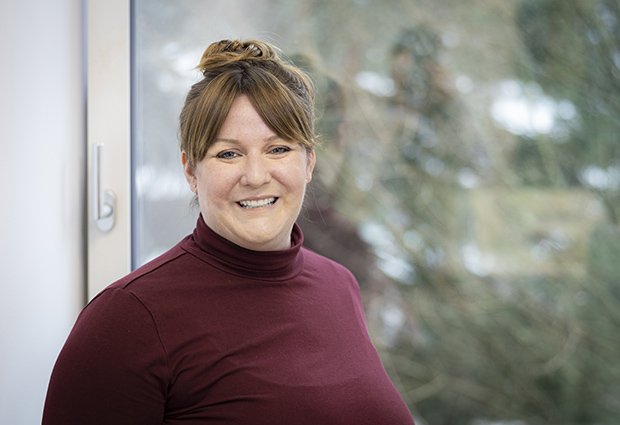
Welcome: Lucia von Bredow
EMBL’s new Science and Society Manager shares her plans for fostering multidisciplinary dialogue

EMBL’s Science and Society Programme aims to create a platform for dialogue and debate, allowing EMBL to explore the ethical, legal, and social implications of scientific research. EMBL’s new Science and Society Manager, Lucia von Bredow, comes to the role with a broad range of experience covering law, policy, and stakeholder relations in science-related fields. Here, she discusses the forthcoming EMBL Science and Society Conference, and the opportunities she sees for enabling dialogue between science and society.
What brought you to EMBL?
I’ve always been fascinated by the point at which law, ethics, science, and society intersect – and I have a particular interest in bioethics. I’m really privileged that my career to-date has allowed me to explore the life sciences from a variety of angles. I started off as a lawyer, then moved into policy and external engagement. I’ve also long had a passion for more collaborative engagement and outreach methods, such as co-production tools and targeted stakeholder involvement mechanisms. My new role at EMBL enables me to combine all those skill sets and interests for the first time, and that’s what makes the position so exciting.
Tell us more about the Science and Society Programme.
The Programme has been running for over 20 years. We intend to promote a broader understanding of the cultural relevance of the life sciences through multidisciplinary events, with a focus on the ethical, legal, and social implications of scientific research. This provides a vehicle for scientists, and experts from a variety of disciplines, to meet with members of the public to engage in dialogue, seminars, discussion meetings, conferences, and symposia. In our first seminar of 2020, Joana Moscoso of Native Scientist is giving a talk on promoting cultural diversity in science, education, and society. We have a variety of other seminars planned across the EMBL sites. Our flagship Science and Society event is the annual EMBL Science and Society Conference, which takes place in November this year.
Lucia’s first Science and Society seminar, featuring Joana Moscoso, takes place at EMBL Heidelberg on 21 February. The title is: ‘The pursuit of a dream: science for me and for all’.
Further details here.
What are your plans for the Conference?
This year, the title is ‘Our House Is Burning: Scientific and Societal Responses to Mass Extinction’. The Conference takes place over two days, with the first day exploring the history of five previous mass extinctions, along with the role of climate change, and asking whether we’re in the midst of a sixth. We’ll also hear about measuring loss of biodiversity across ecosystems and across scales, and we’ll explore how loss of biodiversity affects human health. The second day will focus on scientific and societal responses to mass extinction. We’ll be hearing a variety of perspectives, and will discuss whether there are any innovative scientific and technological solutions to counter loss of biodiversity. We have a fantastic agenda planned. Registration for the event opens in March.
How does your work at EMBL differ from your previous roles?
It’s very different! The collegiate atmosphere is wonderful – everyone is working for a unified purpose, which makes day-to-day life both rewarding and exciting. I realise now that I’d been missing that “we’re all in it together” mindset from my previous roles.
What is the major current challenge in bringing together science and society?
In my view, it’s the challenge of effectively engaging stakeholder groups on issues relating to emerging technologies. It can be a challenge for anyone to keep up with the pace of change around rapidly developing scientific and technological innovations, and particularly for research organisations to facilitate dialogue on those topics in a timely manner. The Science and Society Programme can help play a part in debating such issues. We’re able to invite world-leading experts to EMBL and we provide a vehicle to interrogate controversial issues within a pretty short turnaround time. In this way, we hope to act as the bridge between EMBL and society, for emerging tech – or indeed any topics relevant to EMBL’s research – by enabling engagement and outreach with a wide variety of stakeholders.


